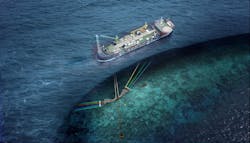Equinor approved for Bay du Nord development offshore Canada
Equinor Canada Ltd. received approval from the Government of Canada for development of the deepwater Bay du Nord oil discovery in the Jurassic reservoirs of the Flemish Pass basin, about 500 km east of St. John's, Newfoundland and Labrador.
Bay du Nord, in 1,170 m of water, holds reserves of 300 million bbl of 34° gravity oil, including volumes from Equinor’s nearby Bay de Verde and Baccalieu discoveries, both made in 2016 (OGJ Online, July 10, 2017; July 27, 2018).
An environmental assessment report determined that the project is not likely to cause significant adverse environmental effects when mitigation measures are considered. Conditions include requirements to reduce greenhouse gas emissions (GHGs) and measures to protect fish and fish habitat, migratory birds, species at risk, air quality, human health, and indigenous peoples' use of resources.
Bay du Nord is the first offshore oil and gas production project to complete a federal environmental assessment process under the Canadian Environmental Assessment Act, 2012 (CEAA 2012). It is the province's fifth development.
Equinor estimates the project will emit as little as 8 kg CO2/bbl of production, compared to the average oil sands emissions of 80 kg CO2/bbl and the overall Canadian average of 40 kg CO2/bbl. Net-zero GHG emissions must be achieved by 2050.
Equinor is operator of Bay du Nord and holds a 65% working interest. Cenovus Energy gained 35% interest with its 2021 acquisition of Husky Energy (OGJ Online, Oct. 26, 2020).
About the Author
Alex Procyk
Upstream Editor
Alex Procyk is Upstream Editor at Oil & Gas Journal. He has also served as a principal technical professional at Halliburton and as a completion engineer at ConocoPhillips. He holds a BS in chemistry (1987) from Kent State University and a PhD in chemistry (1992) from Carnegie Mellon University. He is a member of the Society of Petroleum Engineers (SPE).

